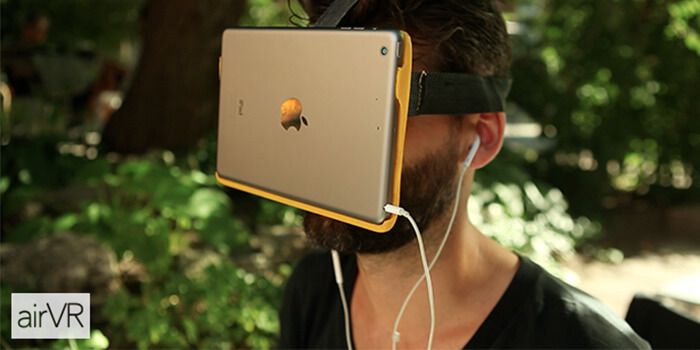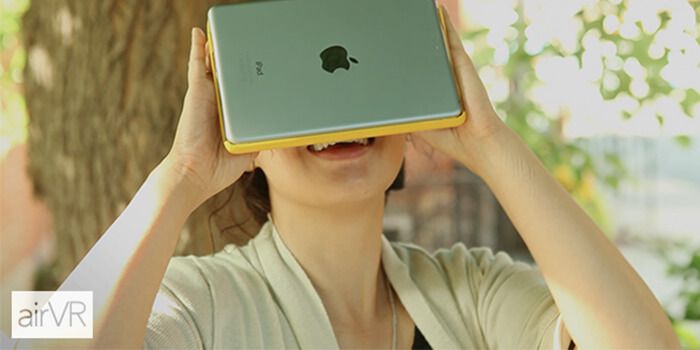It seems like new virtual reality headsets are popping up everywhere these days. We all know about the Oculus Rift and Sony's Project Morpheus, but they're not the only devices that are trying out the new technology. Yesterday we reported on a Kickstarter VR set called the Totem, being developed by the Vancouver-based company, Vrvana, and that's not the only Kickstarter funded, Canadian, VR headset being announced this week.
Toronto-based design studio, Metatecture, is well on its way to introducing the AirVR, a VR headset which uses Apple's iPad Mini. Two days into its Kickstarter, the AirVR is already halfway to its $20,000 goal, and with four weeks still left, it's likely that they will surpass their initial expectations by a large margin.
The AirVR is basically a headset which straps an iPad Mini onto the user's head. A pair of lenses turn the iPad's screen into full stereoscopic 3D. This will work for iPad minis with or without Retina display, and there is also a second model, the AirVR+, which can be used with the new iPhone 6+. Metatecture states that it will use the Kickstarter funding to fine-tune the design and to set up the manufacturing process.
Metatecture believes that "cost, availability, and a lack of content" have kept VR devices from becoming an everyday part of life. With so many Apple gadgets already in the hands of consumers, the price of entry into this VR experience will be significantly lower than other devices. Apple has already shipped over 100 million iPad Minis since its release in 2012; the iPhone 6+ was preordered 4 million times in its first 24 hours.
The AirVR headset will cost only $49. In comparison, the Oculus Rift will seek in the $200-$400 price range when it is available for consumers. Factoring in the cost of an iPad Mini or an iPhone will mean that the AirVR will be more expensive overall for interested parties who don't own one of the required devices, so it is clear that the product is targeted almost exclusively at current Apple product owners.
It is also safe to assume that the AirVR is designed for a more casual gaming experience, as it will rely solely on content from Apple's App Store. The native applications to the device, PhotoVR, MovieVR and PanoVR (which lets users look at panoramic photos in 3D), also make it clear that the device is geared towards non-gamers as well. Since the Oculus Rift, as well as Sony's Project Morpheus, are currently focused on traditional gaming, the AirVR will likely coexist beside these other products without being in direct competition. Then again, Facebook's recent purchase of Oculus could mean the final product will be more geared towards social media than initially thought.
AirVR's more direct competitor will actually be a different Oculus project, the Gear VR, in development by Samsung with Oculus technology. This device will turn the Galaxy Note 4 (and possibly other Android phones in the future) into VR screens, much in the same way that the AirVR will use Apple products. Since both products cater to established consumer bases, it seems unlikely that AirVR or Gear VR will be able to move the needle of mobile phone market share for either Apple or Android.
The AirVR will be shipping Kickstarter orders in December for $49. If successfully funded, the AirVR will also be available for online purchases in 2015.
So what do you think? Is this kind of VR experience something you’d be interested in checking out? If so, check out their Kickstarter page where you can make a donation.


